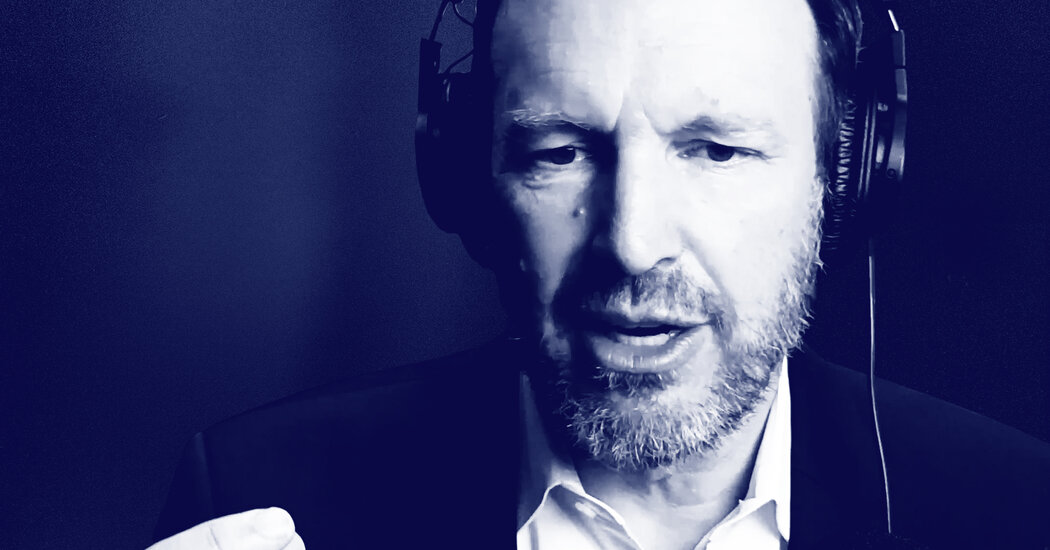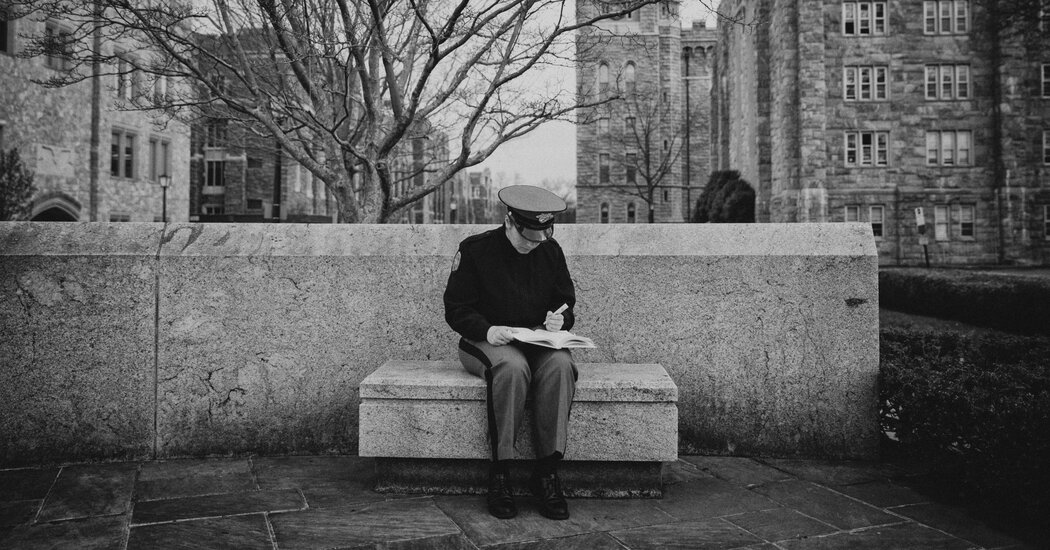Grichka and Igor Bogdanoff, French twins and TV hosts whose noble lineage, questionable research in quantum physics and extreme adventures in plastic surgery captivated Parisian society and horrified the scientific community, died within days of each other at a hospital in Paris, Grichka on Dec. 28 and Igor on Jan. 3. They were 72.
Family statements sent by an agent for the brothers announced their death but did not specify the cause. A lawyer for the twins told multiple French news outlets that they had died of Covid-19. Both said in December that they were unvaccinated.
The Bogdanoff brothers were perhaps best known internationally for their extensive employment of Botox, lip filler and chin sculpting in the 1990s and 2000s, changes so extensive that they rendered them almost unrecognizable, some said almost alien.
It was fitting, the jokes went, because the once conventionally looking brothers had first rocketed to fame in the late 1970s as the hosts of the otherworldly “Temps X” (“Time X”).
The TV show mixed gadgetry, sci-fi and actual science — think “Mr. Wizard” crossed with “Mystery Science Theater 3000,” but weirder than the former and more earnest than the latter — with the Bogdanoffs dressed in silvery suits on a set made to look like the control deck of a spaceship.
Later, they received doctorate degrees in physics and mathematics and published academic papers laying out what they claimed was an explanation for the state of the universe just before the Big Bang.
But their research was soon called into question by scientists in Europe and North America, who said the work was so incomprehensible that, at least at first, it was most likely a hoax by the attention-seeking twins.
The brothers insisted that they were serious, and correct; they later sued several scientists and magazines for libel. That didn’t stop “L’Affaire Bogdanoff” (pronounced BOG-dan-off) from becoming a roast, even as it raised difficult questions about the peer-review process and whether theoretical physics had become so abstruse that it was difficult to tell real work from nonsense.
To many in the scientific community, they were con men. But the French public did not seem to care: Their book “Before the Big Bang” (2004), which encapsulated their research for a general audience, was a swift seller in France, and they hosted two more TV shows in the late 2000s.
And at least someone thought their work was worthy. In the mid-2000s they worked as professors of cosmology at Megatrend University, a private institution in Belgrade, Serbia, that has been accused of operating as a diploma mill.
By then their facial transmogrifications were largely complete and, though often mocked as comically repulsive, they continued to mix with elite French society, dating models and heiresses and making the rounds during gala season. The brothers denied ever undergoing cosmetic surgery, insisting instead that their changes resulted from their dabbling in unspecified “technologies.”
Then, in a final act that seems both fitting and inevitable given the times in which we live, the brothers became a crypto meme.
Their virality, which began around 2015, was not entirely random. The Bogdanoffs claimed to have helped write the source code for Bitcoin, and that its legendary, perhaps fictional inventor, Satoshi Nakamoto, had given them a pair of “ancient” bitcoins “in physical form.”
The meme depicts Grichka as a sort of crypto puppet master, dumping or pumping the markets to thwart a hapless, nameless investor. Whether or not the brothers got the humor, they seemed keen to play along, recently suggesting that they were planning to launch their own cryptocurrency.
Igor Yourievitch Bogdanoff and Grégoire Yourievitch Bogdanoff, who sometimes spelled their surname Bogdanov, were born on Aug. 29, 1949, in a castle in the town of Saint-Lary-Soulan, a ski resort nestled in the French Pyrenees along the Spanish border.
Their father, Youri Ostasenko-Bogdanoff, was an itinerant painter who said he was descended from a Tatar prince and who had fled Russia as a boy. They were raised by their maternal grandmother, Bertha Kolowrat-Krakowska, an erstwhile Bohemian countess who had lost her title after having an affair with Roland Hayes, a Black American tenor who was touring in France. Their daughter, Maria Dolores Franzyska Kolowrat-Krakowska, was the twins’ mother.
Igor’s first marriage, to the Belgian aristocrat Ludmila d’Oultremont, ended in divorce. He married Amélie de Bourbon-Parme, a model and descendant of Louis XIV, in 2009 in a star-studded ceremony at the Château de Chambord in the Loire Valley. They separated in 2016.
The brothers are survived by their half brother, François Davant, and their sisters Laurence, Géraldine and Véronique Bogdanoff. Igor is also survived by a son, Dmitri, whom he had with the actress Geneviève Grad; his daughters Sasha and Anna-Claria and son Wenceslas, all from his first marriage; and his sons Alexandre and Constantin, from his second marriage.
The Bogdanoffs claimed to be geniuses from an early age, saying they had received 190s on childhood I.Q. tests. They graduated with degrees in applied mathematics from the Paris Institute of Political Studies, also known as Sciences Po, and studied at the École Pratique des Hautes Études.
After “Temps X” ended in 1987, the Bogdanoffs wrote “Dieu et La Science” (1991), about the relationship between religion and science. It was a best seller in France, but it drew a lawsuit by Trinh Xuan Thuan, an astrophysicist at the University of Virginia, claiming they had plagiarized one of his books.
The brothers settled out of court in 1995, having in the meantime begun their graduate studies. They said they were motivated by their interest in the so-called initial singularity, the moment before the Big Bang, when all matter, space and time were condensed into an infinitely dense point.
Others, however, suspected that they were trying to raise their intellectual prestige during the lawsuit, and at least one scientist, John Barrow of Cambridge University, said they had approached him about how to get a doctoral degree quickly.
The brothers began their studies at the University of Bordeaux but transferred to the University of Burgundy. Their adviser, Daniel Sternheimer, told The New York Times in 2002 that while the Bogdanoffs were exceptionally intelligent, they were often “impressionistic” in their research. Still, he said, he signed off on their theses.
“These guys worked for 10 years without pay,” he said. “They have the right to have their work recognized with a diploma, which is nothing much these days.”
It was rough going; Grichka was denied a physics doctorate, though he got a degree in mathematics from the École Polytechnique, in Paris, in 1999, while Igor was forced to substantially revise his thesis and publish additional papers before receiving a physics degree from Burgundy in 2002. They each received an “honorable” grade, the lowest and least common.
That same year, rumors began to circle among physicists and mathematicians about a pair of French celebrities who were trying to spoof the scientific establishment, a retread of a 1996 hoax by the physicist Alan Sokal, who managed to get a paper filled with nonsense into an esteemed cultural studies journal.
Eventually, most agreed that no hoax was intended, just inanities masquerading as insight. The pile-on was both painful to watch and impossible to ignore, as scientists took turns dunking on the brothers.
“One thing that seems pretty clear to me is that the Bogdanovs don’t know how to do physics,” John Baez, a physicist at the University of California, Riverside, told The Times in 2002.
The brothers pushed back, growing increasingly litigious, especially after France’s National Center for Scientific Research opened an inquiry into their work. They successfully sued Marianne, a French magazine, for publishing portions of the center’s report, and then unsuccessfully sued the center itself when it concluded that their research was worthless.
But the law cuts both ways, and in 2018 the Bogdanoffs were arrested on charges of “aggressive fraud” after they had persuaded a French millionaire to invest nearly $1 million in a series of unrealized projects, including a reboot of “Temps X.” The millionaire, whose identity was never disclosed, died by suicide in 2018.
The brothers were indicted in 2020 and were preparing to go to court when they entered the emergency room on Dec. 15 with Covidlike symptoms.
Ms. Bourbon-Parme told the BFMTV news channel on Wednesday that the brothers, who were several hospital rooms apart, called each other often to chat, but that doctors had already placed Igor in an artificial coma when Grishka died.
Ms. Bourbon-Parme confirmed that the twins were not vaccinated against Covid-19 but said their decision had been personal, not political.
“They were both 72, they were in great shape, and they thought they were untouchable,” she said, adding that they had always been reluctant to face their own mortality. Death, she said, “was a taboo topic for them, and at the same time it fascinated them.”
Aurelien Breeden contributed reporting.



